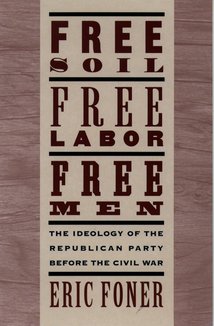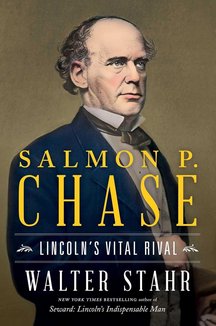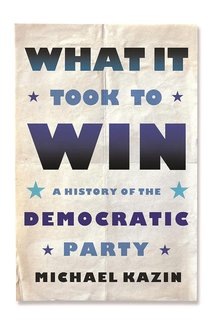Recommended Books

Free Soil, Free Labor, Free Men: The Ideology of the Republican Party before the Civil War
Author:
Eric Foner
ISBN 13:
978-0195094978
Since its publication twenty-five years ago, Free Soil, Free Labor, Free Men has been recognized as a classic, an indispensable contribution to our understanding of the causes of the American Civil War. A key work in establishing political ideology as a major concern of modern American historians, it remains the only full-scale evaluation of the ideas of the early Republican party. Now with a new introduction, Eric Foner puts his argument into the context of contemporary scholarship, reassessing the concept of free labor in the light of the last twenty-five years of writing on such issues as work, gender, economic change, and political thought. A significant reevaluation of the causes of the Civil War, Foner's study looks beyond the North's opposition to slavery and its emphasis upon preserving the Union to determine the broader grounds of its willingness to undertake a war against the South in 1861. Its search is for those social concepts the North accepted as vital to its way of life, finding these concepts most clearly expressed in the ideology of the growing Republican party in the decade before the war's start. Through a careful analysis of the attitudes of leading factions in the party's formation (northern Whigs, former Democrats, and political abolitionists) Foner is able to show what each contributed to Republican ideology. He also shows how northern ideas of human rights--in particular a man's right to work where and how he wanted, and to accumulate property in his own name--and the goals of American society were implicit in that ideology. This was the ideology that permeated the North in the period directly before the Civil War, led to the election of Abraham Lincoln, and led, almost immediately, to the Civil War itself. At the heart of the controversy over the extension of slavery, he argues, is the issue of whether the northern or southern form of society would take root in the West, whose development would determine the nation's destiny. In his new introductory essay, Foner presents a greatly altered view of the subject. Only entrepreneurs and farmers were actually "free men" in the sense used in the ideology of the period. Actually, by the time the Civil War was initiated, half the workers in the North were wage-earners, not independent workers. And this did not account for women and blacks, who had little freedom in choosing what work they did. He goes onto show that even after the Civil War these guarantees for "free soil, free labor, free men" did not really apply for most Americans, and especially not for blacks. Demonstrating the profoundly successful fusion of value and interest within Republican ideology prior to the Civil War, Free Soil, Free Labor, Free Men remains a classic of modern American historical writing. Eloquent and influential, it shows how this ideology provided the moral consensus which allowed the North, for the first time in history, to mobilize an entire society in modern warfare.

Salmon P. Chase: Lincoln's Vital Rival
Author:
Walter Stahr
ISBN 13:
978-1501199233
An NPR Best Book of 2022 From an acclaimed New York Times bestselling biographer, an “eloquently written, impeccably researched, and intensely moving” ( The Wall Street Journal ) reassessment of Abraham Lincoln’s indispensable Secretary of the Treasury: a leading proponent for black rights during his years in cabinet and later as Chief Justice of the United States. Salmon P. Chase is best remembered as a rival of Lincoln’s for the Republican nomination in 1860—but there would not have been a national Republican Party, and Lincoln could not have won the presidency, were it not for the groundwork Chase laid over the previous two decades. Starting in the early 1840s, long before Lincoln was speaking out against slavery, Chase was forming and leading antislavery parties. He represented fugitive slaves so often in his law practice that he was known as the attorney general for runaway negroes. Tapped by Lincoln to become Secretary of the Treasury, Chase would soon prove vital to the Civil War effort, raising the billions of dollars that allowed the Union to win the war while also pressing the president to recognize black rights. When Lincoln had the chance to appoint a chief justice in 1864, he chose his faithful rival because he was sure Chase would make the right decisions on the difficult racial, political, and economic issues the Supreme Court would confront during Reconstruction. Drawing on previously overlooked sources, Walter Stahr offers a “revelatory” ( The Christian Science Monitor ) new look at the pivotal events of the Civil War and its aftermath, and a “superb” (James McPherson), “magisterial” (Amanda Foreman) account of a complex forgotten man at the center of the fight for racial justice in 19th century America.

What It Took to Win: A History of the Democratic Party
Author:
Michael Kazin
ISBN 13:
978-0374200237
A New York Times Book Review Editors' Choice One of Kirkus Reviews ' ten best US history books of 2022 A leading historian tells the story of the United States’ most enduring political party and its long, imperfect and newly invigorated quest for “moral capitalism,” from Andrew Jackson to Joseph Biden. One of Kirkus Reviews ' 40 most anticipated books of 2022 One of Vulture 's "49 books we can't wait to read in 2022" The Democratic Party is the world’s oldest mass political organization. Since its inception in the early nineteenth century, it has played a central role in defining American society, whether it was exercising power or contesting it. But what has the party stood for through the centuries, and how has it managed to succeed in elections and govern? In What It Took to Win , the eminent historian Michael Kazin identifies and assesses the party’s long-running commitment to creating “moral capitalism”―a system that mixed entrepreneurial freedom with the welfare of workers and consumers. And yet the same party that championed the rights of the white working man also vigorously protected or advanced the causes of slavery, segregation, and Indian removal. As the party evolved towards a more inclusive egalitarian vision, it won durable victories for Americans of all backgrounds. But it also struggled to hold together a majority coalition and advance a persuasive agenda for the use of government. Kazin traces the party’s fortunes through vivid character sketches of its key thinkers and doers, from Martin Van Buren and William Jennings Bryan to the financier August Belmont and reformers such as Eleanor Roosevelt, Sidney Hillman, and Jesse Jackson. He also explores the records of presidents from Andrew Jackson and Woodrow Wilson to Bill Clinton and Barack Obama. Throughout, Kazin reveals the rich interplay of personality, belief, strategy, and policy that define the life of the party―and outlines the core components of a political endeavor that may allow President Biden and his co-partisans to renew the American experiment.